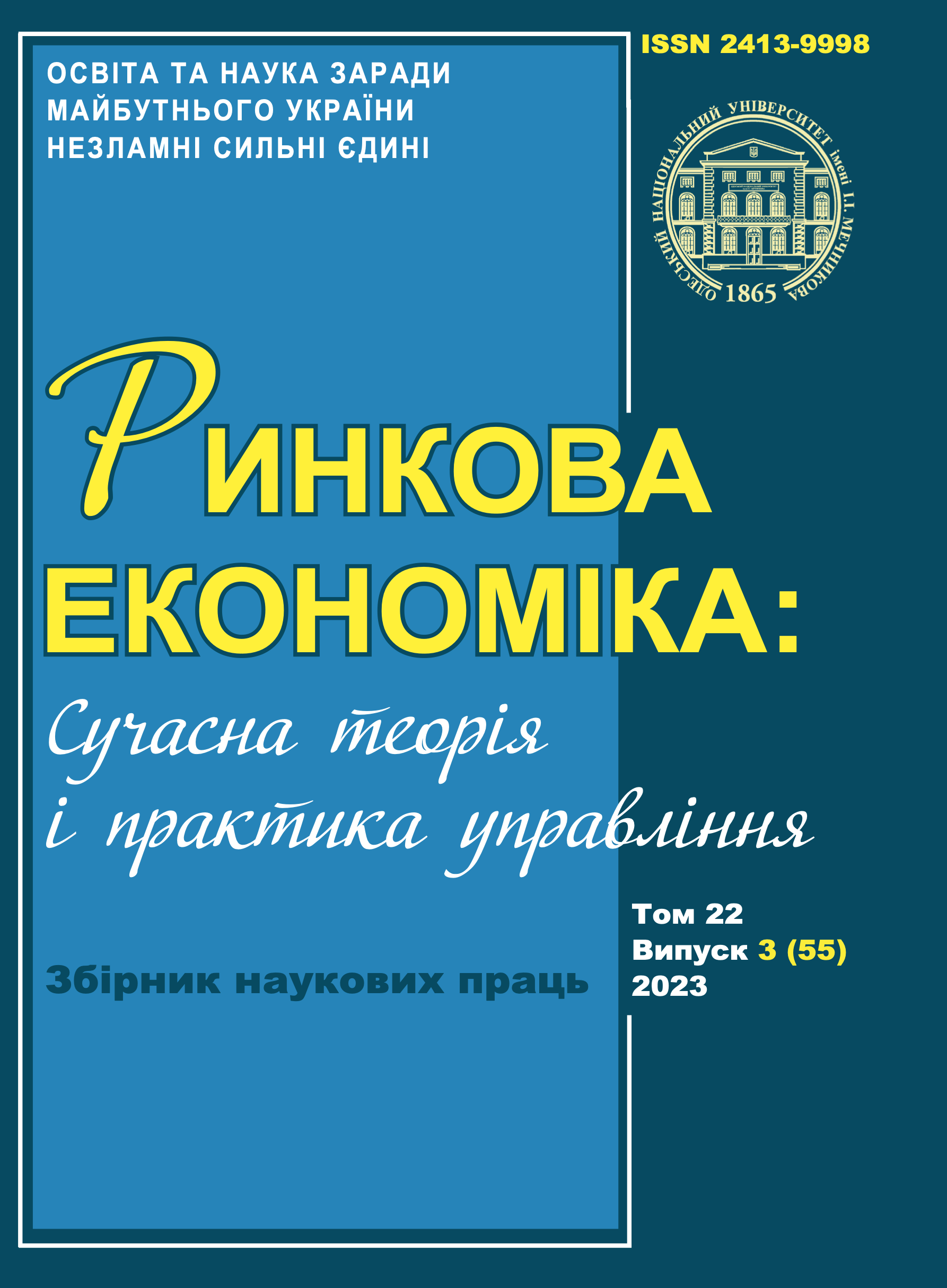ВПЛИВ СЕУ ПІДПРИЄМСТВА НА СТІЙКІСТЬ ЕКОСИСТЕМИ: ВІД ВИМОГ ISO 14001 ДО ВІДКРИТОЇ ЕКОЛОГІЧНОЇ ПОЛІТИКИ ТА СТІЙКОЇ ЕКОЛОГІЧНОЇ ПОВЕДІНКИ
DOI:
https://doi.org/10.18524/2413-9998.2023.3(55).302841Ключові слова:
екологічна політика, підприємство, екосистема, стійкість, система екологічного управління (СЕУ), ISO 14001, модель екологічної поведінки індивідуумаАнотація
Стаття присвячена найменш дослідженому соціально-екологічному аспекту діяльності підприємства з захисту довкілля. Це дослідження спрямоване на виявлення можливостей збільшення позитивного впливу підприємств на навколишнє середовище (становище екосистеми) в регіональному контексті на відміну від досліджень питань сталості та екологічності ланцюгів постачання.
Основною метою даної статті є формування теоретико-методичного підґрунтя якісного дослідження впливу екологічної політики підприємства, а саме ISO 14001 на цінності та поведінку своїх працівників в контексті забезпечення сталого розвитку екосистеми, в якій підприємство розташовано.
Поставленні питання вирішуються шляхом аналізу досліджень на основі мультидисциплінарного підходу. Огляд літератури охоплює різні напрямки менеджменту, зокрема екологічне управління, управління якістю, управління людськими ресурсами, управління організаційними змінами, управління стійким розвитком бізнесу, управління ланцюгами поставок, управління ризиками, а також торкається сфер психології та соціології.
Сформульовано роль та основні особливості відкритої екологічної політики підприємства в соціо-екосистемі, в якій підприємство розташовано. Сформульовано роль індивідуальної екологічної поведінки працівників підприємства у використанні відкритої екологічної політики підприємства для забезпечення сталості локальної екосистеми.
Виявлено основні невідповідності ISO 14001 сучасним викликам соціо-екосистем. Виявлено пробіли ISO 14001 у контексті формування сталої моделі екологічної поведінки працівників. Стійкість моделі екологічної поведінки працівників підприємства розглядається як спроможність переносу екологічних цінностей з робочого місця до приватного життя.
Сформульовано етапи формування сталої моделі індивідуальної екологічної поведінки працівників підприємства.
В результаті дослідження сформульовано блоки питань, адресованих працівникам і топ-менеджерам підприємств, які є теоретико-методичним підґрунтям аналізу впливу відкритої екологічної політики підприємства на екологічні цінності та поведінку працівників. Формування анкет і проведення обстеження має стати подальшим етапом дослідження.
Посилання
DSTU ISO 14001:2015 [ISO 14001:2015, IDT]. (2016). Systemy ekolohichnoho upravlinnia. Vymohy ta nastanovy shchodo zastosuvannia [Environmental management systems. Requirements and guidelines for application]. Kyiv: DP “UkrNDNTs”. [in Ukrainian].
Ashkanasy, N. M., & Dorris, A. D. (2017). Organizational Behavior. Oxford Research Encyclopedia of Psychology. https://doi.org/10.1093/acrefore/9780190236557.013.23
Bąk, J. (2021). Environmental engineering. Zarządzanie środowiskiem i zarządzanie środowiskowe. Kraków: Wydawnictwo PK.
Berkes, F., Colding, J., & Folke, C. (2008). Navigating social-ecological systems: building resilience for complexity and change. Cambridge: Cambridge university press.
Bliesner, A., Liedtke, C., & Rohn, H. (2013). Change Agents für Nachhaltigkeit: was müssen sie können? Zeitschrift Führung und Organisation, 89(1), 49–53.
Boiral, O., & Paillé, P. (2012). Organizational Citizenship Behaviour for the Environment: Measurement and Validation. Journal of Business Ethics, 109(4), 431–445. https://doi.org/10.1007/s10551-011-1138-9
Boons, F. (2013). Organizing within dynamic ecosystems: Conceptualizing socio-ecological mechanisms. Organization & Environment, 26(3), 281–297.
Botequilha-Leitão, A., & Díaz-Varela, E. R. (2020). Performance Based Planning of complex urban social-ecological systems: The quest for sustainability through the promotion of resilience. Sustainable Cities and Society, 56, 102089. https://doi.org/https://doi.org/10.1016/j.scs.2020.102089
Childers, D. L., Pickett, S. T. A., Grove, J. M., Ogden, L., & Whitmer, A. (2014). Advancing urban sustainability theory and action: Challenges and opportunities. Landscape and Urban Planning, 125, 320–328. https://doi.org/https://doi.org/10.1016/j.landurbplan.2014.01.022
Ciocirlan, C. E. (2017). Environmental workplace behaviors: Definition matters. Organization & Environment, 30(1), 51–70.
Clark, S. C. (2000). Work/Family Border Theory: A New Theory of Work/Family Balance. Human Relations, 53(6), 747–770. https://doi.org/10.1177/0018726700536001
Collard, D. (1981). Altruism and the Economy. A Study of Non-Selfish Economics. Oxford: Martin Robertson & Co Ltd.
Costa, P. T., Jr., & McCrae, R. R. (2008). The Revised NEO Personality Inventory (NEO-PI-R). In G. J. Boyle, G. Matthews, & D. H. Saklofske (Eds.), The SAGE handbook of personality theory and assessment (Vol. 2, pp. 179–198). Sage Publications Inc. https://doi.org/10.4135/9781849200479.n9
Du Plessis, C. (2008). Understanding cities as social-ecological systems. World Sustainable Building Conference, Melbourne, Australia, 21–25 September 2008. https://researchspace.csir.co.za/dspace/handle/10204/3306
Fischer, A., & Eastwood, A. (2016). Coproduction of ecosystem services as human–nature interactions – an analytical framework. Land Use Policy, 52, 41–50. https://doi.org/10.1016/j.landusepol.2015.12.004
Folke, C., Hahn, T., Olsson, P., & Norberg, J. (2005). Adaptive governance of social-ecological systems. Annual Review of Environment and Resources, 30(1), 441–473. https://doi.org/10.1146/annurev.energy.30.050504.144511
Fonseca, L. M., & Domingues, J. P. (2018). Exploratory Research of ISO 14001:2015 Transition among Portuguese Organizations. Sustainability, 10(3), 781. https://www.mdpi.com/2071-1050/10/3/781
Fortuński, B. (2008). Does the environmental management standard ISO 14001 stimulate sustainable development? Management of Environmental Quality: An International Journal, 19(2), 204–212. https://doi.org/10.1108/14777830810856582
Frank, R. H. (1988). Passions Within Reason: The Strategic Role of the Emotions. New York: W. W. Norton & Co. https://books.google.pl/books?id=xXtrQgAACAAJ
Frey, B. S. (2013). Economics as a Science of Human Behaviour. Towards a New Social Science Paradigm (2nd ed.). New York: Springer. https://doi.org/10.1007/978-1-4615-5187-4
Fritz, C., Sonnentag, S., Spector, P. E., & McInroe, J. A. (2010). The weekend matters: Relationships between stress recovery and affective experiences. Journal of Organizational Behavior, 31(8), 1137–1162. http://www.jstor.org/stable/41683967
Graves, L. M., Sarkis, J., & Zhu, Q. (2013). How transformational leadership and employee motivation combine to predict employee proenvironmental behaviors in China. Journal of Environmental Psychology, 35, 81–91. https://doi.org/10.1016/j.jenvp.2013.05.002
Groth, M., Hennig-Thurau, T., & Walsh, G. (2009). Customer Reactions to Emotional Labor: the Roles of Employee Acting Strategies and Customer Detection Accuracy. The Academy of Management Journal, 52(5), 958–974. https://doi.org/10.5465/AMJ.2009.44634116
Houck, O. A. (1998). Are humans part of ecosystems? Environmental Law, 28(1), 1–14.
ISO 14063:2020. (2020). Environmental management – Environmental communication – Guidelines and examples. Geneva: ISO.
Jabbour, C. J. C. (2015). Environmental training and environmental management maturity of Brazilian companies with ISO14001: empirical evidence. Journal of Cleaner Production, 96, 331–338. https://doi.org/10.1016/j.jclepro.2013.10.039
Józwicka, R., Pac, T., Rudnicka, M., Skruczaj-Olejnik, A., Wojciechowska, M., & Wypych, A. (2022). Ekonomiczne aspekty ochrony środowiska 2022. Warszawa: Główny Urząd Statystyczny.
Kahn, W. A. (1990). Psychological conditions of personal engagement and disengagement at work. The Academy of Management Journal, 33(4), 692–724.
Kallis, G., & Norgaard, R. B. (2010). Coevolutionary ecological economics. Ecological Economics, 69(4), 690–699. https://doi.org/10.1016/j.ecolecon.2009.09.017
Kim, W. G., McGinley, S., Choi, H.-M., & Agmapisarn, C. (2020). Hotels’ environmental leadership and employees’ organizational citizenship behavior. International Journal of Hospitality Management, 87, 102375. https://doi.org/10.1016/j.ijhm.2019.102375
Lambert, S. J. (1990). Processes Linking Work and Family: A Critical Review and Research Agenda. Human Relations, 43(3), 239–257. https://doi.org/10.1177/001872679004300303
Mader, A., Patrickson, S., Calcaterra, E., Smit, J., et al. (2011). Poradnik TEEB dla miast: usługi ekosystemów w gospodarce miejskiej. Kraków: Fundacja Sendzimira.
Mosgaard, M. A., Bundgaard, A. M., & Kristensen, H. S. (2022). ISO 14001 practices – a study of environmental objectives in Danish organizations. Journal of Cleaner Production, 331, 129799. https://doi.org/10.1016/j.jclepro.2021.129799
Muñoz-Erickson, T. A., L. K. Campbell, D. L. Childers, J. M. Grove, D. M. Iwaniec, S. T. A. Pickett, M. Romolini, & Svendsen, E. S. (2016). Demystifying governance and its role for transitions in urban social–ecological systems. Ecosphere, 7(11), e01564. https://doi.org/10.1002/ecs2.1564
Muster, V., & Schrader, U. (2011). Green work-life balance: A new perspective for green HRM. German Journal of Human Resource Management, 25(2), 140–156.
Ozcelik, H. (2013). An empirical analysis of surface acting in intra-organizational relationships. Journal of Organizational Behavior, 34, 291–309.
Pickett, S. T. A., Boone, C. G., McGrath, B. P., Cadenasso, M. L., Childers, D. L., Ogden, L. A., McHale, M., & Grove, J. M. (2013). Ecological science and transformation to the sustainable city. Cities, 32, S10–S20. https://doi.org/10.1016/j.cities.2013.02.008
Pickett, S. T. A., & Cadenasso, M. L. (2002). The Ecosystem as a Multidimensional Concept: Meaning, Model, and Metaphor. Ecosystems, 5(1), 1–10. https://doi.org/10.1007/s10021-001-0051-y
PN-EN ISO 14001:2015-9. (2015). Systemy zarządzania środowiskowego – Wymagania i wytyczne stosowania. Warszawa: Wyd. Polski Komitet Normalizacyjny.
PN-EN ISO 14004:2016-04. (2016). Systemy zarządzania Środowiskowego – ogólne wytyczne dotyczące wdrożenia. Warszawa: Wyd. Polski Komitet Normalizacyjny.
Ramus, C. A., & Killmer, A. B. (2007). Corporate greening through prosocial extrarole behaviours – a conceptual framework for employee motivation. Business Strategy and the Environment, 16(8), 554–570.
Ryan, C., Browning, W., & Walker, D. (2023). The economics of biophilia: Why designing with nature in mind makes financial sense (2nd ed.). New York: Terrapin Bright Green, LLC. http://www.terrapinbrightgreen.com/report/economics-of-biophilia-2nd-ed
Rzeńca, A. (2016). Polityka ekologiczna miasta. In A. Rzeńca (Ed.), EkoMiasto#Środowisko. Zrównoważony, inteligentny i partycypacyjny rozwój miasta (pp. 89–115). Łódz: Wydawnictwo Uniwersytetu Łódzkiego.
Simpson, D., & Sroufe, R. (2014). Stakeholders, reward expectations and firms’ use of the ISO14001 management standard. International Journal of Operations & Production Management, 34(7), 830–852. https://doi.org/10.1108/IJOPM-02-2012-0063
Söderlund, J., & Newman, P. (2015). Biophilic architecture: a review of the rationale and outcomes. AIMS Environmental Science, 2(4), 950–969. https://doi.org/10.3934/environsci.2015.4.950
van der Brugge, R., & R. van Raak. (2007). Facing the adaptive management challenge: insights from transition management. Ecology and Society, 12(2), 33. http://www.ecologyandsociety.org/vol12/iss2/art33/
Wagner, M. (2013). ‘Green’ Human Resource Benefits: Do they Matter as Determinants of Environmental Management System Implementation? Journal of Business Ethics, 114(3), 443–456. https://doi.org/10.1007/s10551-012-1356-9
Yue, G., Wei, H., Khan, N. U., Saufi, R. A., Yaziz, M. F., & Bazkiaei, H. A. (2023). Does the Environmental Management System Predict TBL Performance of Manufacturers? The Role of Green HRM Practices and OCBE as Serial Mediators. Sustainability, 15(3), 2436. https://doi.org/10.3390/su15032436
##submission.downloads##
Опубліковано
Як цитувати
Номер
Розділ
Ліцензія

Ця робота ліцензується відповідно до Creative Commons Attribution-NonCommercial 4.0 International License.
Автори залишають за собою право на авторство своєї роботи та передають журналу право першої публікації цієї роботи на умовах ліцензії Attribution-NonCommercial 4.0 International (CC BY-NC 4.0).
Автори мають право укладати самостійні додаткові угоди щодо неексклюзивного розповсюдження роботи у тому вигляді, в якому вона була опублікована цим журналом (наприклад, розміщувати роботу в електронному сховищі установи або публікувати у складі монографії), за умови збереження посилання на першу публікацію роботи у цьому журналі.
Політика журналу дозволяє і заохочує розміщення авторами в мережі Інтернет (наприклад, у сховищах установ або на особистих веб-сайтах) роботи, оскільки це сприяє виникненню продуктивної наукової дискусії та позитивно позначається на оперативності та динаміці цитування опублікованої роботи (див. The Effect of Open Access).



